|
I read the article, "MFA or POC" in the New Yorker by Junot Díaz a few months ago when it was first printed, and I felt a genuine sadness for him that his MFA experience was so unfulfilling. I am a graduate of Spalding University's Low Residency MFA program. My experience there was one of support, empathy, respect and encouragement. Now, did I always feel like my work was 100% understood. Of course not. However, I never felt like any of my teacher/mentors or fellow classmates tried to marginalize or invalidate my work because maybe they were not writing about black folks from the rural south. Yes, there were times when I was the only black person in the room, but truly, I never felt like that fact inhibited the discussion.
Sometimes there were more questions in workshop than solutions. The workshop leaders/classmates really sank their teeth into the work being discussed. They challenged their own interpretations. Sometimes people relied on those in the room who are closest to the culture being written about. Often discussions turned to literature that was similar to the work being discussed, but never did I ever feel like my work was not being taken seriously. A lot of my stories are slave narratives written in dialect. Again, no one ever said, "why are you writing in that difficult, hard to understand language?" And to be honest, much to my surprise, fellow classmates and mentor/teachers treated dialect like it was a language, something I never experienced in graduate school before. If anything, people encouraged me to continue to write in dialect, and as a result, I was able to develop my skills in writing this beautiful language in such a way that I can maintain the reverence I feel for it but it also present it in a readable and understandable fashion to my audience of readers. I credit our leaders at Spalding, Sena Jeter Naslund, Kathleen Driskell, Karen Mann and Katy Yocom, for making it clear that the workshop is designed to encourage the writer whose work was being discussed and not tear down the writer or leave that person feeling abused and unvalidated. Now that does not mean we didn't have some intense discussions and disagreements at times, but at the end of the day, we realized our competition, as so eloquently stated by Sena, "was not in the room but in the library and bookstores." I never felt the uber competitiveness at Spalding that I've heard other MFA grads from other schools talk about. Even now, the vast majority of my community of supporters and friends are my Spalding classmates/mentors/teachers/leaders. So, I said all of that to say, research closely the MFA programs that are out there. Don't just take for granted what their materials say. And don't pick a school just because your favorite writer teaches there. Go visit them. Ask if you can sit in on a workshop or lecture. Talk to graduates/current students/teachers. Most times, they will tell you the truth. And of course, I would love for you to check out Spalding. My life changed radically when I walked into the MFA office at Spalding, not really sure if being a writer was still a viable option for me. Karen Mann made me believe that day that not only was my dream possible, but she was going to do everything in her power to support it. And I found this to be true for everyone else I encountered at Spalding. If you would like to find out more about The Spalding low residency MFA in Writing Program, click here. BIO: Angela Jackson-Brown is an award winning writer and poet who teaches Creative Writing and English at Ball State University in Muncie, IN. Her work has been widely published in journals like The Louisville review, New Southerner Literary Review and 94 Creations, to name a few. She is the author of, Drinking From A Bitter Cup, and is hard at work writing her second novel.
1 Comment
 Sometimes, trying to push out the words of a new story or poem is just like trying to push out a newborn. The words get stubborn and comfortable inside the mind where they've been gestating for days, weeks, months, sometimes years. They cling onto the notion that they are safer if they stay wrapped up inside the uterus of the writer's mind. So, sometimes we writers need a literary midwife or two or three to coach us and coax that baby out. Somebody who'll stay with us and that story 'til the birthing process is done. Somebody who'll say, "Daughter, let those words go. Ain't you tired of carrying that full-term baby around in your belly? You are? Then bear down, baby. Bear down and push that baby out." I am in the wonderful, scary space of completing my second novel. The bearing down and pushing out of the words has, at times, been difficult, but thankfully, I have a village of literary midwives who are constantly encouraging me and pushing me to birth this baby out. So, today, I honor them. They know who they are. Love.  The only thing separating them from me is I got lucky. The only thing separating them from me is I got lucky. The only thing separating them from me is I got lucky. The only thing separating them from me is… Today, I walked into a prison for the first time in my life. I didn’t know what to expect. I didn’t know if the women would be hostile. Violent. Mistrusting. Accusatory. Apathetic. I didn’t know. I was excited to be there with them, but I still prepared myself for the worse. I prepared myself to face a room full of angry women who resented my freedom to come and go as I pleased. I imagined a classroom of women shackled and chained by the choices they made that led them to a life of incarceration. I imagined a cross between Orange is the New Black and Shawshank Redemption. I tried to prepare myself for the fact that these women would be nothing like me. Nothing like me. Nothing like me. The only thing separating them from me is I got lucky. The only thing separating them from me is I got lucky. The only thing separating them from me is I got lucky. The only thing separating them from me is… I looked each woman in the face. Smiling faces. Hopeful faces. Faces similar to the fresh faces I see each time I teach at the University. I heard names like Denise, Angel and Amy. Names that didn’t inspire fear. Names that implied they could have been doctors. Lawyers. Teachers. Names that didn’t convey poor choices. Names that any of us could bear. The only thing separating them from me is I got lucky. The only thing separating them from me is I got lucky. The only thing separating them from me is I got lucky. The only thing separating them from me is… I saw women with tattoos that mirrored my own. Nothing scary. Just names of babies. Names of boys they thought would love them to infinity and beyond. Images of loved ones gone but not forgotten. Birds. Hearts. Bible Verses. I heard women tell stories similar to my own – stories of abuse, self-loathing, and anger. I saw regret in the eyes of women who knew there would be no do overs. I saw women who, under normal circumstances, would be my colleagues. My next door neighbors. My best friends. My sisters. My aunts. My mothers. I heard women with life sentences speak about dreams for the future. I looked in mirrors and saw me looking back. The only thing separating them from me is I got lucky. The only thing separating them from me is I got lucky. The only thing separating them from me is I got lucky. The only thing separating them from me is… I saw women whose psyche was sometimes so fragile they hid from the night like it was an abusive lover. I, too, fear the night sometimes. I, too, wonder will that elusive sun really come out tomorrow. I saw graceful movements. I heard lyrical voices. I saw beautiful flowers I wanted to rescue and take home with me so they could stretch towards the light and grow the way they were meant to grow. Only grace and good fortune allowed me to say my good-byes and walk outside into the light, but, before leaving, I promised. I’ll be back. I won’t leave and unremember you. I’ll be back. I promise you, I’ll be back. The only thing separating them from me is I got lucky. The only thing separating them from me is I got lucky. The only thing separating them from me is I got lucky. The only thing separating them from me is… 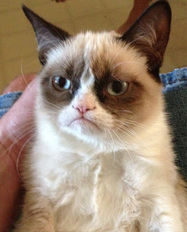 "No, I'm fine. Why do you ask?" "No, I'm fine. Why do you ask?" Today, I am not having a fun time being writer. In fact, most of this week hasn’t been fun. Why, you ask? Well, instead of working on my next novel or having imaginary conversations with Gayle and Oprah about my book, I have had to put aside my creative hat and focus on my marketing hat. I have made 15 phone calls to bookstores about possible book signings. I have sent out over 50 emails to book stores, book clubs, book reviewers, and members of the press about the release of the book and upcoming events. I have visited half a dozen bookstores and I have given out tons of flyers and postcards. I have made posts to Facebook and Twitter urging my family and friends to write reviews and post them to Amazon, Barnes and Noble, Books A Million and Goodreads. And I’m not even counting all of the hard work my husband Robert and other friends have done to try and get the word out. Whew. No one said this writing thing went beyond sitting at a comfy desk with a nice mug of tea while the writing muse has its way with me. Okay, okay. Before you say, “Blah, blah, blah, stop complaining. Wasn’t this your dream?” Let me just say, yes, you are right. But it doesn’t change the fact that this part of the process is not fun. I am an extroverted introvert, meaning, I can turn on the charm when I have to, but in all honesty, a great day to me is a day when it is just me, my muse, and my keyboard. Making phone call after phone call where I have to spark enthusiasm in the hearer on the other side of the phone is not my idea of a good day, hence why I never went into sales. I was teasing a friend the other day when I said I have heard everything this week but “It’s not you. It’s me,” when I called various bookstores trying to set up book signings. Nobody told me that most bookstores are not interested in granting signings unless you are already well-known. Whodathunk? It’s like being back in the day when I was a new job hunter and I couldn’t get a job because I didn’t have a job. But you know, in spite of that fact, those of us who write and publish can’t give up. Even if 9 out of 10 people turn us down and make us feel like our life’s work is not much more than a blip on the radar screen of publishing, we can’t give up. Why? Because of that one success, and yes, that one success matters. So, here are some tips to writers who are interested in publishing: 1. Make sure you spend some time building your presence on social media. Promoting your work becomes a little easier when your friends, family and colleagues are also helping to get out the word. 2. Get ready to be a cheerleader for your work. If you are too timid to shout about your work from the rooftops, you have probably selected the wrong career path. Yes, there are authors who write in isolation and never interact with the public and somehow find a way to get their work to its intended audience, but really, those writers are few and far between. Make sure you enter into the publishing process believing you will have to do most of the heavy lifting when it comes to marketing your work. Even those who publish with the large presses are finding themselves having to utilize their skills as marketers to plug their work. 3. Get organized. I have half a dozen templates of letters, emails, press releases, etc., so when I find a new outlet to send material to, all I have to do is tweak my template and then Voila!, it is off to my new potential resource without me having to spend hours recreating the wheel. 4. Schedule your day so that you are not trying to market your work and write creatively in the same time and space. There is nothing that will suck away your creativity more than knowing you have to send off press releases, type up mailing envelopes, or talk on the phone with individuals who might be lukewarm, at best, when it comes to talking to you about your work. 5. Delegate or ask for help. Once you are in publishing mode, you need a team – a team of unpaid (or paid if you roll like that) “staff” who can take some of the burden off your shoulders so you really can spend more time being creative. As I’ve said repeatedly, my husband has been my rock throughout this entire process so far. My great friend, Lauren, who has hosted an event, helped with the copy editing, and sent out reviews and press releases, has been invaluable in this whole process, and daily, I am asking her to do more and more. So, whenever people say, “Is there anything I can do to help you publicize your work,” take them up on their offer! Get them to make phone calls. Get them to send out books for review or press packets (to those who still want hard copy packets). Get them to show up at your readings and help with all of the behind-the-scene duties that will overwhelm you on the day of your signing. So, I offer you writers this advice, not to discourage you but to prepare you for those days when the writing life just doesn't seem rewarding. When literally and figuratively you are getting doors slammed shut in your face and you say to yourself, "But I have an ISBN number. Ain't I a writer too!" Just remember, unless you are already Alice Walker or Toni Morrison or any of the other rock stars of publishing, don’t expect the red carpet to automatically be rolled out to meet you at every venue you imagine yourself reading in. Unless you are a literary giant already, don’t expect the New York Times to come knocking down your door to do a book review for your book. Instead, go into this publishing thing like it is truly a business venture that in the beginning, there may not be very many individuals believing in your work besides you and your good old Aunt Susie. And that is okay. Just make sure you help Aunt Susie learn how to send a tweet, because, really, initially, she might be all you’ve got. Now, back to marketing my book. Oh, and by the way, do any of you have Oprah on speed dial? Okay, okay! Just asking. Sheesh! :)  Source: Fun At Zoo Source: Fun At Zoo Shortly after the Fourth of July in 1998, I suffered a stroke. Like most days, I woke up with an excruciating headache, and like most days, I popped a couple of Tylenols and tried to forget about it. However, on this particularly morning, there was no forgetting it. By the end of the day, I was in the intensive care unit of Dale County Hospital in Ozark, AL, unable to move my left side or speak. I was terrified that I might die, or worse (In my mind), lose the ability to think clearly. I also remember thinking, I am 30 years old, and if I died today, what would be the legacy I would leave to my son, Justin? At that point, I was in a marriage that was past the point of needing to end. I had unresolved issues about my childhood. But most of all, I did not believe that I had done anything in the world that would make anyone remember I had ever even been here. At that moment, I promised myself if I survived, I would live every day like it was my last. Some days I’ve fallen short of that goal…by a lot. But all and all, I think I did a pretty good job of at least remembering my goal, even when I didn’t meet it. So here we all are. On the cusp of a brand new year. If you had asked me that summer of 1998 would I still be here almost 16 years later, I probably would have laughed (if I’d had the strength) at the very thought. Mainly because, my prayer that day was simple: “God, just let me live to see my son graduate from high school.” Thankfully, I exceeded that wish. So now, as the world contemplates their New Year’s resolutions, I encourage us all to not worry so much about the things we want to do different in 2014. We have plenty of time for that. Instead, let’s celebrate all of the things we’ve gotten right in 2013. I mean, look. We’re still here. We may have royally messed up from time to time in 2013, but we survived it, and hopefully, we are coming out on the other side stronger and wiser. Let’s vow to leave all negativity in our rear view mirrors. Let’s look back at 2013 as a success because we’ve made it this far, and let’s meet 2014 with a year’s worth of positivity and the mental fortitude to make it the best year ever. Happy New Year Everyone! 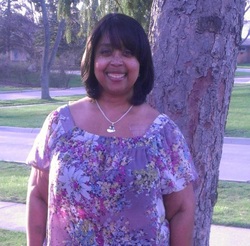 Tracy Butler Tracy Butler Although I met many of my birth family nearly 13 years ago, my cousin Tracy and I have only “met” over the telephone, via Facebook, and through email exchanges. Yet, even though we have never had a face-to-face meeting, we have clicked just like cousins who had the good fortune to grow up together, sharing summer vacations filled with silly little secrets and long walks down Alabama dirt-filled roads. Over time, my cousin, Tracy, has shared her story with me. Let me just say, Tracy’s story is phenomenal – just like her. I asked her would she be willing to share it with others on my blog. I am a firm believer, like Good Morning America’s host, Robin Roberts says, “Our mess can become our message.” Tracy has had to overcome a lot of “mess” over the last few years, but she has never lost hope or faith that her tomorrows will be better than her yesterdays. So, here is my Cousin Tracy’s story. May the readers of her journey be as positively touched and helped by her words as I have been. BIO Tracy English Butler is 41 years old and the married mother of six children. Her children range in age from 18 to 10 (the ten year olds are twins). Tracy says she never envisioned herself as having such a large family. Instead, she thought she would be a full time career woman. But Tracy is the first to say she has no regrets and loves every part of being the mom to her amazing, beautiful family. As a child, Tracy grew up in an upper middle class neighborhood with two loving parents, Edward and Jean English. She has one sister, Kelly English Quirolo, and a whole host of loving aunts, uncles, and cousins. Tracy and her husband, Mario, have been married for 19 years, and when asked the secret of their long lasting relationship, Tracy says, “Running our household and raising six children has been a task requiring endurance, love, compromise, and understanding.” All of their children are in school full-time and about a year and a half ago, Tracy returned to school herself to get a graduate degree in counseling. Tracy was accepted to a challenging program at her Alma mater, Oakland University in Michigan, and was breezing right along carrying a 3.9 grade point average when all of a sudden she was stopped in her tracks by some devastating news. Here is the rest of Tracy’s story. Hi, Tracy. Thank you for agreeing to take our private conversations public. I truly believe your story has the ability to change lives. If you don’t mind, will you tell my readers what happened to you nearly two years ago that brought you and all of your carefully laid plans for the future to a temporary, screeching halt? Well, Angela, I found out that I had a brain tumor. The technical name for it is a Meningioma. Ninety plus percent of the time Meningiomas are benign which leads many people to think it is not that serious. Well, it is very serious, as the brain is a very delicate and complicated structure and any type of tumor that is pressing on it is therefore pressing on brain tissue or other delicate structures. Wow, Tracy. So what were the particulars of the Meningioma you suffered from? In my case, my Meningioma was on the left side of my skull. It was wrapped around my carotid artery and it pressed against my optic nerve. I went through a 10 hour craniotomy and I now have a titanium plate AND screws in my skull. Thank God my tumor is benign, but I have still endured the most difficult time of my life. What are some of the effects you’ve experienced as a result of this brain tumor, and has there been anything positive to come out of this situation? Everything about me is different. I have a right leg that slightly drags and it gets worse when I am fatigued. My speech is affected at times and I suffer from a fatigue that is indescribable. Cognitively I am not the same. I skip words when I talk and I forget that I have said things so I will often repeat myself. Yet, all of the changes in me have not been negative. I have conquered and faced many fears I never thought I would be able to. I am more vocal now and am in charge of my medical files and treatment. I realized quickly that doctors are blessings but they are not GODS. I am still healing even a year later as the tumor was removed in July of last year but I am here and able to tell my story and best of all, I am still blessed to be able to enjoy life with my husband Mario, my children, my family and my friends. You’ve also conquered another great hurdle, Tracy. Every time I hear the story, I am amazed. Would you share with my readers what that great hurdle was? Well Angela, as you know, over the past year I have lost over 147 pounds. Cousin, no matter how many times I hear the story, I continue to be astounded that you battled a brain tumor and weight loss…all around the same time! If you don’t mind, please tell my readers how you did it? Over the years I had tried diet plan after diet plan. Weight loss was constantly on my mind. I wanted to fit in and not loathe going shopping because nothing fit. I spent my younger years being told "you have such a pretty face, if you would just lose weight." The whole weight issue has been a very hurtful part of my life. In school, I was the last to get picked in gym, and through the years, people would not be-friend me because of my weight. Throughout my life, I have been bullied and teased. Finally, I made the decision to have weight loss surgery called the Gastric Sleeve, whereby 85% of my stomach was removed. I had the surgery done about six months before I found out I had a brain tumor. In my surgery, there was no re-routing of my intestines or creation of a pouch or new stomach. I am now only able to eat about 1/4 of what I used to eat at one sitting. I am not promoting this surgery or encouraging anyone else to have it done, but I will say this about it. The surgery saved my life and I couldn't be happier in this department. I still have about 40lbs to lose to be at what is considered a normal weight, but to tell you the truth I feel comfortable right now at the weight I am. Some people believe having weight loss surgery is taking the easy way out but I can say with all honesty, it is not! I still must choose healthy foods to eat and incorporate exercise into my daily routine. Tracy, you are truly an inspiration. Although you haven’t mentioned it yet, you have other health issues that have slowed you down some. What are they? I have Rheumatoid Arthritis, Chiari Malformation, and chronic anemia caused by a deficiency in the blood called G6PD. I also suffer from osteoarthritis and two bulging discs in my neck. I know it sounds like a lot of health issues but I am just trying to manage things one condition at a time. And Tracy, let me just say, you are doing a phenomenal job managing everything, including, a new career. But Tracy, let’s be frank. A lot of people would have said, after dealing with just one of the things you have dealt with, "Okay, I give up." But you never did. What kept you motivated to not stop? I have had many, many days when I have just wanted to crawl into a hole and never come out of it. But, I keep my mind busy by reading each day and speaking with and keeping in contact with friends and classmates from school. I gladly accept help from my family and others who offer. But most of all I hold my head high. On the days I am in a lot of pain I pray, spend quiet time outside in nature by walking slowly around my neighborhood and I pray some more. And, as you mentioned, I have even begun my own business. I am an Avon representative! Running the business is helping me in the cognitive areas that I am struggling with and it also allows me to stay engaged with others. Lastly, Avon is providing a secondary source of income for my family, despite my disabilities. But why Avon? What drew you to that particular company? Avon is a company that has successfully been in business for over 100 years, and Avon representatives have the flexibility of running a small side business or build something larger. I love that the prices are reasonable and I personally use many of the products myself. Also, I love working for a company that sells itself. Everyone knows Avon! My memories of Avon representatives are those ladies who used to come door-to-door. Has Avon changed from that model at all? There are still representatives who operate their business door-to-door only. But then there are those representatives who prefer to run their business online. Either way, running an Avon business requires getting the word out; whether it is through passing out brochures or establishing a web presence. I try to do both. Each campaign, I try to canvas my neighborhood with books and I try to reach new clients online. Recently, I began a Facebook Business Page called Avon Beauty. For example, even though you and I are in different states, separated by hundreds of miles, I am still able to be your “Avon Lady” through my website. The online component of Avon is what has taken it from being your grandmother’s Avon to what it is today, not to mention the fact that the products have also evolved over time. All in all, Avon is the same in some ways, but different in all the ways that count. Well, I must confess, cousin. I do love getting those boxes with all of my neat Avon products every few weeks. Especially the products for my feet! (Laughing) Yes, I know. Well, Tracy, thank you for sharing your story with me again and with my readers. As I said before, your story is remarkable, and I would say that even if you weren't my cousin. I truly believe others will be as touched by your story as I was and continue to be. Thank you, Angela. Readers, if you would like a chance to win some incredible Avon products, leave a note for Tracy below and automatically, you will be entered into a drawing for a gift bag valued at $25. The winner of the gift bag will be announced on her Facebook Avon Beauty page on September 22, 2013. I will also announce the winner here on my blog. Click here to subscribe to her Facebook page. If you have additional questions about Avon or Tracy’s story, you can email her at [email protected]. If you enjoyed this interview and would like to read more like it, please subscribe to my blog on the right side of the page! Take care. 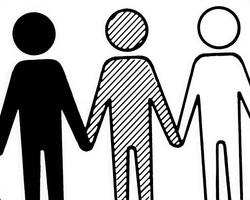 I am a child of the south. I have some very fond memories of growing up in the small town of Ariton, Alabama. I am a proud, southern writer and many of my family and friends reside there, so the south will always be home for me. But similar to Countee Cullen, in his poem, “Incident,” a great deal of my memories are clouded by the sting of racism. Perhaps the racism that hurt the most was from those “benevolent racist.” They were kind-acting. Wanted the best for everyone, even if it meant the continuation of segregation. In their minds, we all would be better off if we just kept things the way they were. But if you questioned them about their “attitudes,” they would insist that they “don't see color.” Many of their close friends, they would say, were “Colored, Negro, Black, African American, etc.” My short essay, “'Lost in 1993” is about my first day of college at Auburn University. As much as I knew I had overcome to get there, it took the actions of one student to spiral me downward into the rabbit hole of self-doubt. “Lost in 1993” is my story of falling, but it is also my story of getting back up. Lost in 1993 “Are you lost?” he asked, smiling, with an almost tender concern on his face as I stood hesitantly at the door of the classroom. I had followed the sound of lighthearted conversation and banter; sure that one of those self-assured unknowns would know where I was supposed to be in the next ten minutes. I entered the room. The room had tables and chairs arranged in an awkward circle and the view from this room on the 9th floor of the Haley Center was breathtaking. I could see Jordan Hare Stadium from the windows. I imagined my son and me there watching ballgames together. I sighed. This was my dream deferred and in spite of everything that had seemed to sidestep me from this dream through the years, I had finally made it! I smiled at the guy who stood there waiting for my response. I guess I was in such awe of actually being in the place I'd dreamed of for so long, that his questions flowed right through me without even registering in my psche. Plus, he had a Jesus-like look of patience on his face. Like if I never spoke, he would have still waited there looking welcoming and affirming. I was relieved for his concern. I had been circling the halls of the Haley Center for several minutes and I was afraid of being late for my first official graduate class. I had approached getting into Auburn University’s graduate school like I had approached everything else in my life—with grit, determination and the tenacity of a pit bull. I had secured grants, scholarships, housing and daycare for my son, so, the first day of class had been a long time coming, but in spite of, or maybe because of all that I had gone through to get there, I just knew I was about to live out my greatest dream. I reached out my hand to shake his. He seemed to hesitate for a moment. I even remember him looking at my hand in a strange manner, as if something was wrong with it, but before I could withdraw it, he grasped my hand firmly. "Hi," he said. "I'm *Court." Although concerned about being lost, my face could not contain its smile, particularly since the young man and his friends were behaving so friendly. I thought to myself, these are my fellow comrades and they are welcoming me. My smile threatened to split into halves, thirds, and into an unrecognizable mass of teeth and gums. "Hello," I said, shaking his hand firmly. Just like my daddy had taught me. Always look people in their eyes when you shake their hand, he had told me. The mark of an educated person is one who is not afraid to look a man straight in his eyes. I wanted to tell this smiling fellow that my first class was medieval literature and yes, I was lost. I wanted to tell him I liked Beowulf. I had read it in high school, and when I realized that we would be studying it in my graduate class, I pulled it out and reread it, making all of the intelligent sounding comments in the margins that I could think of. I wanted to be prepared. I wanted to tell him all of those things, share with him my excitement, but before I could say another word, he quantified his question; still, with the same benevolent smile he’d had from the beginning. “You know this section of the Haley Center is for graduate students? Right?” He sounded so innocent. But the alarm system that people of color possess that alerts us to the fact that we have just been hit with an invisible racist hand slap started chiming in my head. Like the loud, ominous sound of church bells. Instead of the words I know he spoke, I instead heard: You know this section of the Haley Center is for White’s only? Right? I think at that moment I dropped my eyes to the floor, and tried to regain the composure that had surely slithered off of me into a limp pile by my feet. To this day, Court does not know that his words took me back in time. If questioned about the incident, if he even remembered it, he would probably say he meant no harm. And you know, I would probably believe him. But it wouldn't change the sting I felt when he said it. In that moment, he violently tossed me into the rabbit hole that led back to the segregated south of my youth where I peed in Colored’s Only bathrooms and drank from my people’s very own personal drinking fountains that spewed out bitter streams of water. Slowly, I looked back up at Court again. He was still smiling. I studied him. He was dashingly handsome. Like a young Dean Martin or Clark Gable. But in that moment he became ugly. Like a steely-eyed Bull Conner ordering water hoses to knock down innocent, brown faces whose only crime was the desire to partake in civil disobedience. His few words stripped me of the advances Colored people had made and I was once again reminded me that I was The Other—the story that existed outside of the margin. Court was a benevolent racist. The kind who meant no harm. Later, he would "compliment" me by saying things like, "Well, one thing is for sure, Angela. You will always have a job" OR he'd say, still with a smile, "It's not easy getting a job if you are a white man." When he said things like that, I would find my anger rise up inside of me like the dry bones that came to life again in the biblical story. I had run out of compassion’s milk to offer to the ignorant lips of the Court’s of the world. I had run out of prayers of forgiveness for their lack of understanding of how their words were the matches that caused invisible crosses to burn. In that moment, I was no Jesus praying for his offenders. I was praying for that Old Testament God of vengeance to rear his head again and strike down those people like Court who continued to drape themselves in the covering of ignorance. But on that monumental day when Court asked me if I was lost, I realized something important. That day wasn’t just for me but it was for my grandparents, my dad and mother, Miss Eveline who used to give me Wrigley’s Spearmint gum during church services, my aunts and uncles and cousins, and all those elders from my home town, alive and dead, who never even got a chance to sit at the welcome table because they were too busy serving at it. Remembering that important fact allowed me to swallow hard and smile at Court and his merry band of men, and reply in a voice filled with confidence and pride,that even surprised my ears, “No, Court, I’m not lost. I’m where I belong. Would you mind helping me find my way?” *Name changed. 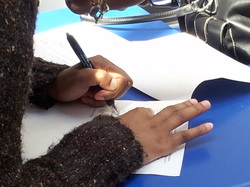 The picture to the left is of me signing my book contract with WiDo Publishing. Oh. What. A. Feeling. To read more about my dream come true, click here.  “Writing is a socially acceptable form of schizophrenia.” ~ E. L. Doctorow Because I was raised as an only child, hearing voices was a normal occurrence for me. Before I could even read, I invented elaborate stories about my stuffed animals, my imaginary friends, and myself. And no matter what the story, I always had a particular voice for each stuffed bear, each long-legged Barbie and each imaginary prince who was coming to sweep me—his little brown-skinned Princess—away to some fairy kingdom. And when I wasn’t creating my own voices, I would often times sit (well hidden so as not to be seen or disturb the storyteller) and listen to my Dad and his brothers and friends tell elaborate stories about people they knew, and always, always their stories were accompanied by the voices of the person they happened to be talking about. And as a result, these people became more than words out of the storytellers’ mouths, they became living, breathing people who embodied the very soul of the oracle relating the story. As a result of my “voice-filled” childhood, it became second nature for me to hear the voices of the characters that I would create in my own writing. And until I heard them, until I could hear each character’s individual personality radiate through every word of dialogue, until I heard the very timbre of their voices, my characters did not exist for me. The voices in your story are the DNA makeup of your characters. The voices are what makes your characters tick. I like knowing all sorts of details about my characters. Things like: Date of birth. Time of birth. Place of birth. Parents names and ages. Siblings names and ages. Etc. I also like to SPEAK OUT LOUD the dialogue of my characters. Speaking out loud is so very important for developing the voice of each character. If you hear your characters, then you can more easily catch when you’ve written dialogue or action that doesn’t fit with your characters. So, ask yourself: Does your character speak fast? Slow? Does she stutter when she’s nervous? Does she have a drawl or does she speak with the clipped cadence of a Northerner? Walk around. Embody your character – mind, spirit and soul. Ask questions that will allow you to get as deep into the psyche of your character as you can because there is where voice resides. So here are some potential questions you can ask your character during a pre-writing interview. And really act this out. BE the character. Not the writer. Not the reviser/editor. But the actual character from your story. Some of the potential questions you can ask are: Question 1: What is your earliest memory? Question 2: Which of your parents showed you the most love? In what way? Question 3: What type of people did you hang out with in high school? Question 4: Who was your first sexual partner? Did you enjoy it or not? Question 5: What is the worst thing you ever did to a person that you loved? Question 6: What is the worst thing that was ever done to you by someone you thought loved you? Question 7: How would your family and friends describe you? Question 8: What is something that you have done or said that you wouldn’t want your mother, father, spouse, and/or children to know about? Question 9: Are you living your best life? If not, why not? Question 10: What is the most interesting thing that has ever happened to you? Question 11: What is your most pressing need right now and what would you do to get it? |
Archives
March 2021
Categories
All
Blog Roll
|
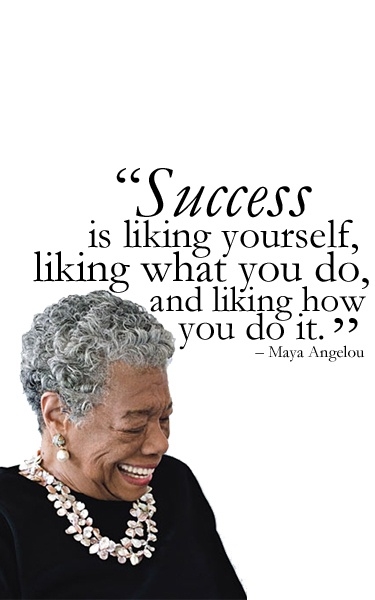
 RSS Feed
RSS Feed







